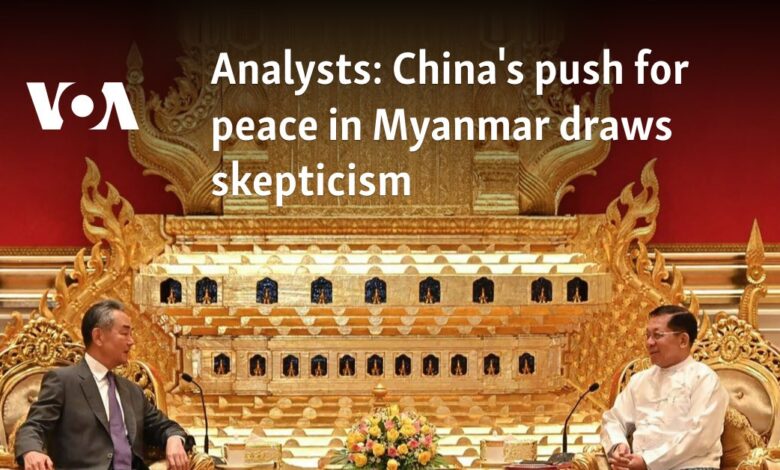Analysts: China’s push for peace in Myanmar draws skepticism

Offers from two armed resistance groups in Myanmar to participate in Chinese-brokered peace talks with the ruling junta are seen by analysts as the result of mounting pressure from Beijing and unlikely to end the wider insurgency.
The Ta’ang National Liberation Army (TNLA) credited China’s mediation efforts when it announced its readiness for peace talks on November 25, shortly after junta leader Min Aung Hlaing visited Beijing.
The Myanmar National Democratic Alliance Army (MNDAA) made a similar announcement on Tuesday. Both groups are members of the Brotherhood Alliance, which has been involved in a broad offensive against the junta since October 2023.
Chinese Foreign Ministry spokesperson Lin Jian said Wednesday that Beijing welcomed the MNDAA’s “positive remarks,” but he emphasized the need to protect Chinese interests.
“Relevant parties must avoid endangering the security of China’s border areas, Chinese nationals and projects in Myanmar,” Lin said, adding that China will continue supporting the peace process.
China’s approach to Myanmar’s crisis
China maintains close ties with Myanmar’s military and the rebel groups near its border. The MNDAA represents a Mandarin-speaking Han Chinese ethnic group native to the region and known as Kokang.
Recent reports indicate Beijing is exerting greater control over the rebel groups, known as ethnic armed organizations, or EAOs. Allegations surfaced that the leader of the MNDAA had been placed under house arrest in China — a claim Chinese officials deny.
Myanmar-based political analyst Than Soe Naing attributed China’s evolving stance to its concern over resistance forces’ recent victories.
“The fall of the Northeastern Command of the Myanmar military exposed the junta’s vulnerability,” he said. “This realization pushed China to prevent a potential collapse of the regime.”
Than Soe Naing added: “The military council agrees to everything China demands, guaranteeing Beijing access to its goals.”
Hla Kyaw Zaw, a China-based expert on China-Myanmar relations, said Beijing is pressuring both the junta and EAOs to negotiate.
“Beijing’s goal is to bring all parties to the table,” she said, noting that a recent call for “eternal peace” from the junta leader notably lacked his usual demand that the rebels lay down their arms. She said that likely reflected Chinese influence.
The MNDAA’s and TNLA’s willingness to negotiate comes as China blocks critical supply routes for items such as food and medicine. According to various observers, this has weakened the rebels both militarily and politically, making them more likely to comply with Beijing’s demands.
The International Institute for Strategic Studies noted in a July report that China had restricted cross-border trade in response to EAO offensives.
A Myanmar doctoral candidate and researcher specializing in regional conflict studies, who requested anonymity for safety reasons, described China’s current pressure on the EAOs as “the most formidable in recent times.” The pressure “is particularly intense on groups near the Chinese border, such as the TNLA and MNDAA,” the researcher said.
Economic and political stakes
China’s economic interests, particularly its investments in the China-Myanmar Economic Corridor and Belt and Road Initiative projects in Rakhine State in western Myanmar, are key drivers of its peace initiatives.
However, analysts say Beijing’s influence on EAOs is not absolute.
Than Soe Naing and Hla Kyaw Zaw both noted that the Rakhine-based Arakan Army (AA) is less vulnerable to Chinese pressure than the border groups because of its location, control over key interests, and strategic ties with India and Bangladesh.
“This combination of geographical distance — about 2,000 kilometers — and its autonomous military and economic stance makes China approach the AA with significant caution,” said Than Soe Naing.
Hla Kyaw Zaw also noted that the AA’s resilience stems from strong local support.
“Unlike border groups, the AA isn’t shielded by China, making it vulnerable to military aerial attacks, but its backing from the Rakhine people gives it legitimacy,” she said.
The AA continues its offensive in western Myanmar, claiming control of 10 townships and fighting to secure seven more, including four largely under its control.
According to the Institute for Strategy and Policy – Myanmar, an independent think tank, the AA had gained partial control over nine out of 11 Chinese projects in Rakhine State as of August 18.
Hla Kyaw Zaw and Than Soe Naing also pointed out that the Kachin Independence Army (KIA), another major EAO in northern Myanmar, continues its offensive against the junta and has taken control of key border crossings to China. Although China exerts the same pressure on the KIA, the Kachin group retains leverage due to its economic independence and stronghold in resource-rich regions.
Both analysts remain unconvinced that peace can be achieved under external pressure.
“The truce calls by the EAOs address immediate survival needs but fail to tackle long-term aspirations like federalism,” said Than Soe Naing.
Hla Kyaw Zaw echoed these doubts. “The junta’s refusal to share power remains the primary obstacle,” she said. “Peace brought about by pressure cannot last long.”
“The KIA’s control over jade mining in Kachin and the AA’s position in Rakhine give them leverage to resist Chinese demands,” said Than Soe Naing. “These groups are not entirely dependent on Beijing.”




